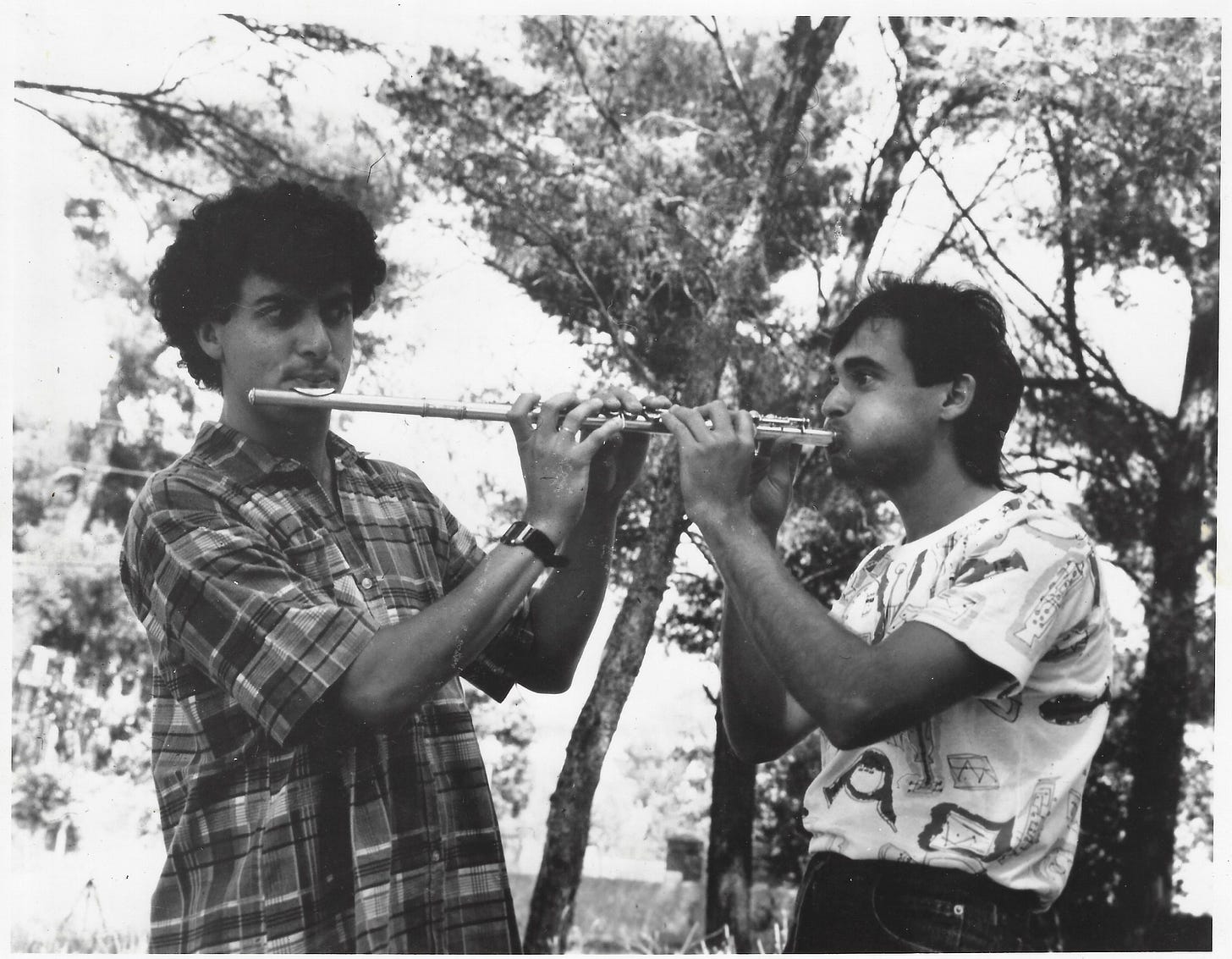Most of you know me as a pianist. The piano has been my primary instrument since I was 12 years old. It challenges so many parts of my being and demands that I combine the ability to read notes and chord symbols while mapping gestures that generate certain sounds, known as voicings, connecting everything with intuition. I love playing the piano, but becoming friends with the flute changed my life.
When I joined Hermeto Pascoal’s Grupo in 1977, my job was primarily to be an accompanist for Hermeto, so he could play more woodwinds. Hermeto used to play an aluminum flute made in East Germany by G.Rudolf, such as the one described here. Hearing what Hermeto could do on the flute gave me a completely different musical insight into the nature of melody and the power of air. He used a pickup and ran his flute through an electronic effects box. His use of feedback when connected to a guitar amp gave him the nickname of O Bruxo (The Wizard), because he wielded the flute like a magic wand, getting sounds like Jimi Hendrix. The only video I could find of Hermeto playing his electrified flute is this one from 1980:
Here is Hermeto reading his beautiful ballad Montreux, which he had just composed in our hotel room a few hours before we hit the stage at the Montreux Jazz Festival in 1979. Notice his unique approach to holding the instrument, very different from conservatory-trained flutists. His phrasing and embellishments of the melody are exquisite.
This is a rare recording from a cassette tape of mine, taken from the sessions for the album Cérebro Magnético in 1980. The piece is a gorgeous ballad, Flavia. I am on piano and Itiberê Zwarg is on bass. The chord changes are super complex, and Hermeto flies through them without looking at the chart:
The bass flute became one of Hermeto’s signature sounds, because of his ability to control the tones of both the flute and his voice, creating multiphonic chords and incredible percussive effects with his mouth. The recording below is very rare. It was made in 1989 in Copenhagen, Denmark, when Hermeto opened his orchestral Suite Pixitotinha commissioned by the Danish Radio with an improvised bass flute solo:
Here is a video of Hermeto improvising on the bass flute:
Being able to hear countless Hermeto flute performances over the years left me with a strong desire to play the flute and join the party. Hermeto helped me buy my first flute in Tokyo in 1979. When Carlos Malta joined our Grupo in 1981, I had two very different inspirations to draw from. Hermeto wrote a lot of flute music in the 1980s, including flute duos, quartets and even a piece for 10 flutes. I learned so much from his concepts. His music demands a deep mastery of the flute. Hermeto can test the limits of the instrument and the musicians, but always aware of its physical limitations. Once of his most challenging pieces is called Difícil Mas Não Impossível (Difficult But Not Impossible).
JSN with Carlos Malta, 1980s
Here is a video I posted recently of a piece that Hermeto wrote for flute and alto sax, Peixinho (Little Fish). It was super hard for me to learn that song, but daily practice helped. Here is a studio recording of Peixinho with Jane Duboc on vocals:
Having been raised in the agreste region of northeastern Brazil, Hermeto’s sensitive ears picked up the sounds of birds from the region, and one of the results is the plaintive Bacurau (Whippoorwill), played here by the great Paul Taub with me at the piano:
You might already have seen this video of Hermeto playing his bamboo flute in a river, filmed in a park in São Paulo state in 1985. We are accompanying him on water bottles. Hermeto also can play a wide selection of wooden flutes.You can hear a lot of them in these two pieces:
Dança Da Selva Na Cidade Grande (Jungle Dance in the Big City), recorded in 1980. Hermeto plays all flutes and percussion. The rest of us recited some verses he wrote in the studio:
In 1982 we recorded Magimani Sagei with the Grupo, and Hermeto again paints a wild landscape with the flutes. Carlos Malta and I are on “regular” flutes. Hermeto added all the wooden pifes and much more:
Once I moved to Seattle, I continued to explore the flute as a fantastic way to imagine melodies, free from the linear pattern that the piano inspires. My own flute sound can be best described as a “swarm of wasps inside a paper bag”, but I find that instead of being a flute soloist like Hermeto or Carlos Malta, I am a team player. Having a dialogue with another flutist is one of my favorite musical experiences. Here is the title track from my 2007 album Alma do Nordeste (Soul of the Northeast), in which I play dual (or duel) flutes with Carlos Malta.
In my Quinteto album Current from 2010, I played three flute tracks on my solo in the baião I composed Matraca (Rattle). Harvey Wainapel is on alto sax.
Hope you enjoyed this panorama of Hermeto Pascoal’s flutisms.
Thanks for subscribing to my Substack!
Jovino





I love flutes. I played the concert flute as a child and teen. I currently play Native American flutes.
My first image of you is as a flute player. I think I saw you perform in Seattle, but the memory is vague.
He rocks it at the piano too! Wow!